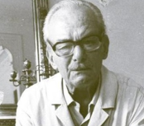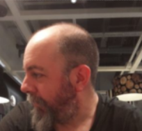
Translated from the Turkish by Neil P. Doherty
Translator's Note
Over a career that spanned six and a half decades, Melih Cevdet Anday published eleven collections of poems, eight plays, eight novels, fifteen collections of essays, a book of memoirs – and won all of Turkey’s poetry prizes. He made his publishing debut as a member of the Garip movement which aimed to revolutionize Turkish poetry by jettisoning the traditional metres and tropes of the older verse and replacing them with a bare poetry stripped of metaphor and written in the language of the street. In subsequent years he moved away from this style and began to write in a more philosophical vein. He also explored the history of Anatolia through the lens of Hittite, Sumerian and Greek epic poetries, a turn which did not endear him to nationalists and had many, inaccurately, brand him as a western poet writing in Turkish. His poetry is varied and rich, in each of his books he tried out new styles and new modes of expression and was still experimenting right up to his last collection, which was published in 1995.
1. The Race
Of these has a blind poet sung:
At Troy the horses too, had souls.
Their neighing was heard as far as Hades,
Horseless neighs that would horrify the dead,
And drive the dog of hell mad in rage
At times the sound of hoofs galloped through the Trojan sky:
The uneasy soul of an unburied horse.
That day had the Achaeans raced for someone else
Achilles would have carried off the first prize to his hut,
His horses being immortal,
Given as gift by Poseidon to his father Peleus,
Who in turn passed them down to his own son.
Now the horses mourn Patrocles,
Their hearts heavy, their manes sweeping the earth.
Diomedes harnessed the horses of Tros to his chariot
Horses taken as spoil from Aeneas
Who had been saved by a God.
Then rose Fair Menelaus, son of Atreus,
The God like hero harnessed two horses to his chariot:
Aethe, Agamemnon’s mare and his own Podargus,
Antilochus hitched up his Pylian horses
As Ruşen Ali arose to mount his Grey Horse:
Two wings on either side,
he knew neither near nor far
And then they dragged out the conceited Trojan horse;
Into the air spread the smell of burning cedar,
That made all the other horses uneasy.
Next passed Mohammed’s gift to his son-in-law Ali,
The gentle mule Duldul, her nether regions shrouded.
Slowly wandered through the polytheistic horses
Her eyes seeing but little.
With head slant to one side, Alexander’s Bucephalus
Followed, eyes deep like the maidens of India,
Forever gazing to the South as if he sensed
How close the waters of the Granicos were.
As soon as El Cid’s Babieca passed, Rosinante emerged
In tears.
Do not speak to me of horses!
I know they are born of a mother’s womb, at night in the dark
In the stable, someone holds a lamp, the light flickers
On the straw, the breathing, the coughs of the mare
She turns her head: “Is he like me?”
“Are his hoofs white?”
Do not speak to me of horses!
Like morning’s fields, drifting away from the earth
Like it’s screaming waters leaps winged Pegasus
Out from the breaching skies- my son, my youth!
It was a crazed time of mourning, vengeance, bodiless birds,
broken stars, and the scar of a forgotten day.
Like small seedless lakes raised as monuments to the dead
Like unclothed emptiness and defeated space that
Never ending race…Horses, horses! I have yet to see one age
Some seek to topple towers with their manes,
Some still scrabble at the earth with their hoofs.
Do not speak to me of horses!
My heart cannot bear the thought of them fallen
And writhing on the ground, so do not speak of this.
Do not speak to me of this, I did not witness the siege of Troy.
2. Poison
Have you heard?
What Mehmet the mechanic of Bursa heard?
Because he knew the city,
That smelt of tar, fish and pinewood,
That smelt of women as unsettled as meadows,
Was to be burnt
Laocoön was bitten by a poisonous snake,
And on the windy shores of Ilion
He and his children writhe and writhe in agony.
On the shores gather the remnants of death,
The remnants of life and love,
The word lost and found in thought,
Eternity, like a sought after broken statue,
On the shores gather glory and the sublime, and the enemy
For the sea is not yet expired, only sleepless
And halved as it recedes in its pierced barrel
Turbid with the corpses of old.
“On the bus on the way back from the Izmir fair
I saw Ilion, shrouded in cloud”
They have pitched all the books into the gas chambers
In Dresden, in Cologne, in Munich
Über allen Gipfeln ist Ruh
“Birds crash into airplanes in the sky
Wings, feathers and beaks rain down on the city”
Have you heard?
All the girls working our whorehouses are foreign
La, Li, Lu their names….
“So what
Has happened to the child abandoned on the mountain?
That is what is on everybody’s lips.
Has he fallen prey to the wild beats and fowl of the forest,
Could we not find his scattered limbs,
To piece together a whole person again?
And would it not do, were he to be without a torso?
Were he, not, to be?”
3. The Dream
“Towards morning
In the long hungry hour when the dove
Gathers up in one swoop the crumbs of the night,
When unborn children taughten the bow of dreams,
The women sees in her own dream the child and the fire”
“And so it was the child they abandoned on the mountain, while
the dream and the fire remained. Ah If only it were the dream they had abandoned.”
“Yes, we feared the dream, as was right and proper,
Though it was beyond us to interpret it
Or to do what it required of us.
The fire will wait until the child grows,
So let the hobbled inscription of the coming days,
Let the mirror wounded by the beaks of birds also wait.
Wine is always drunk yet always put on hold,
As it is red; the colour of spattering blood,
Of the day that comes and returns, of the song that drags on.
Have we not divided the day into seven, the night into five?
Have we not sealed the sleepless water of our resistance?
Have we not pitched the moon far beyond birth,
And lengthened the leaden shaft of sleep?
Let the reeds wait in the enigmatic waters,
The vigilant bird watching from the moon’s dry edge,
The snowplough that blunts the stones of the unbuilt city,
Ah let them wait, the forehead marked out to wait, will wait,
Grabbing on tight to the tide, it will wait.
Round and round go the water, the earth,
the shameless weeds of the mind, the carousel,
the drapes, the temple and stairs,
Round and round eternal happiness and boredom,
And we wait, living through what was given us.”
“How the augur has suffered,
Do you think we will be able to bear,
For God knows how many years, the burden of our unease?
We had no idea what tomorrow would bring,
We still do not know, but this child is hope,
A hope among our hopelessness.
Go now and find him in the forest”.
4. The Return
The forest is a magic net thrown by the naked
Natives, the mountain a hunted, dazed
Horse, endeavouring to free its head,
And steadily climbing up towards the hollowed waters
of the skies.
Down below,
Between the walls and the sea, the walls nine times
Knocked and the sea seven times forsaken,
Between the dream and the fire’s two wings,
Between the bolt of emptiness protracting time,
The constant reel of the river coercing
The bustling willows to speak in the tongue of death,
And those straits, that contiguous wall of all endings
The horses whirl round and round… I have yet to see one age,
Some seek to topple towers with their manes,
Some still scrabble at the earth with their hoofs.
Meanwhile the prizes still wait: a woman,
A tripod with handles, a six-year-old mare,
A cauldron unscathed by fire, a two handled pot.
Shouts, roars, the sound of hoofs, clouds of dust….
Über allen Gipfeln ist Ruh
“So what,
Has happened to the child abandoned on the mountain?”.
5. Fortune
You see this blue bead? A camel driver was holding it
Not so long ago. In truth he was a strange man.
He’d have his fortune told, then fight against it
Tooth and nail. I do not understand. He was, it seems,
Drowned crossing the Euphrates. Fortune is a hungry dog,
You chase it away, it returns and finds you again.
This bullet in front of me, how do I know whose fortune it is?
For Macbeth I foresaw the throne, it did not come to pass.
And yet I did not tell him he was to kill the King.
It is not in my hands to lengthen time,
Or to shorten it. Yat sat tat ksanikam.
Look, I have blinked and everything has passed.
Tomorrow is yesterday and yesterday has yet to be.
This bean, let it be the child you hold, I push it
Right down the mountain…. How much time has gone by?
I do not know. Is it he, is it another? Again I do not know.
Light the lamp, its light is different come evening,
Different at midnight, different again towards morning,
But the lamp is the same lamp.
Santana ksana dharmas. Believe it or believe it not.
6. Love
The forest would start when you held my hand,
And part down the middle like a fig,
We’d run to the top, bent over, breathless,
Rising and falling with the trout, slowed down
By the pine needles. Do not let go of my hand,
Do not let go…….
Then we’d slide right down to the bottom,
Where silence stooped over like a tree
And put down roots in you and in me, looking
For whatever water the earth might muster up,
Your sunflower breasts, turn to the light,
I’d walk like the hours of noon across your chest,
I’d walk like a memorial arch on either side of you.
Then we’d start to run again,
Up higher and higher, to the hollowed waters
Of the sky. I’d kiss you and you’d tremble.
Love that brings together shattered moments, does not dream.
Oh forest, fate of the hunted horse, oh hungry dove
Of new beginnings! No fate have we.
We burnt it like the fleck in the eyes,
Like the single grain in the beaks,
Of the migrant birds. No fate have we.
__



























0 Comments